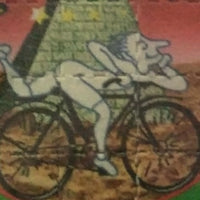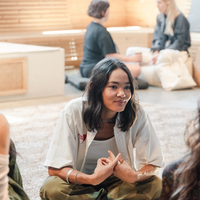While many high school students in the mid-2000s were busy pirating music and meticulously adjusting their top friends on MySpace, Raghu Appasani was testing hypotheses in the neuroscience labs at Harvard University.
After cutting his teeth in the labs of Harvard, he spent the summer break after 10th grade researching neuronal pathways and memory formation at Columbia University under the Nobel Prize-winning scientist Eric Kandel.
“We looked at how long-term memories formed and did a lot of animal work and cell work in the lab,” Appasani says. “We went from there into researching RNAi and stem cells in pediatric brain tumors.
“It was very hard sciences for me for most of high school,” he adds.
Later, at Wesleyan University in Connecticut, Appasani veered away from lab work to study neuroscience and philosophy. Having spent years doing hard science, and like any young artist who has finally mastered the fundamentals, he began to think outside of the box—or, in his case, the lab. His interest shifted to the application of mental health treatment in the world at large.“I started to look at mental health from a different angle,” he says, “and what it means to be human and communicate with one another.”
The Journey to MINDS
Appasani hit a wall while doing research at Mount Sinai Hospital during his undergraduate studies at Wesleyan. He didn’t see his lab work helping real people struggling with mental health issues, so he traveled with a nonprofit to the state of Bihar in northeast India to gain some perspective.
“Bihar is one of the poorest states in India, has a lot of violence, and is even physically dark because of where it’s located. I was checking people for cataracts with flashlights in little villages. It was wild,” says Appasani.
“What I learned,” he goes on, “is that human suffering comes from poor mental health, and if we can empower people with the tools and modalities to help their mental health, they can enhance their quality of life.”
Appasani’s father hails from a small village in India and worked hard to attend and complete college and graduate school. He taught Appasani that education is the key to generational growth. After his nonprofit work in India, Appasani realized that educating people about mental health is the key to bettering psychological well-being for this generation and the next.
With that in mind, in 2010, and at just 20 years old, he founded the MINDS Foundation to spread mental health awareness in India.
“I started MINDS with the premise that we educate people about mental health and provide them access to resources, versus just throwing a clinic there and forcing some model onto them of what we think will be helpful,” he says. “I wanted to actually teach them and empower them and have conversation and dialogue and discourse.”
Despite initial skepticism from the mainstream mental health communities in India, the MINDS Foundation has since served over 3.2 million people across India with mental health education, training, counseling, research initiatives and the first and only 24/7 toll-free mental health helpline. Appasani and the foundation also produce media like the award-winning short film “RISE UP,” which spreads the message that mental health issues can affect anyone.
Mental Health Hits Home
Appasani pushed himself too hard by the end of college, leading him to develop unhealthy coping mechanisms in the form of wine and spiked lattes. To combat his anxiety healthily, Appasani turned to rituals like yoga and meditation. After moving to Southern California in 2018 for a psychiatry residency at USC, he prioritized spending time outside and hiking in between hospital shifts.
But then COVID-19 hit. None of his training or self-care rituals prepared him for how to cope with the stress of being on the frontlines of the pandemic. The healthy habits he adopted in medical school were worn away by the stress of work and the inability to see his friends and family.
“On July 3, 2020, I had suicidal thoughts,” he says. “I was just laying there emotionally and spiritually drained and couldn’t physically move. It was rough.”
Exhausted and steeped in isolation, Appasani was struck with a moment of clarity. He realized that the despair and emotional pain he was experiencing was just a sliver of what his patients felt on a regular basis.
“It’s important for me to share that story because, as a healthcare provider and a psychiatrist, we don’t always acknowledge that we also suffer to some degree,” he says.
Appasani forced himself to slow down and restored his daily rituals like hiking, yoga, journaling and cooking. He also started waking up earlier to meditate and ground himself before starting the day. To balance out these solo practices, he set aside more time to connect with his loved ones.
“I recognized the importance of my family and invested time into connecting with them,” he says. “I’d been too driven by the hustle of work and my career. At the end of the day, my family, friends, community and personal wellness are really what are important to me.”

Raghu Appasani is MUD\WTR's mental health advisor
Pivoting to Psychedelics
With years of experience in eminent labs and hospitals on each side of the country, and as a mental health advocate in India, Appasani is now turning the focus of his expertise onto psychedelic research. He has joined the research team at UC San Francisco’s Translational Psychedelic Research Program or TrPR Program and is pursuing a fellowship in addiction therapy.
“I hope that people understand that psychedelics are not an overnight fix,” he cautions. “Plant medicines are just tools to add to your mental health toolkit. The healing will always come from the therapy and the work.
“The Western medical model teaches that if we take something, it will make us better, but that’s not what a psychedelic is,” he adds. “The power of medicine comes from the power of being in a community.”
Appasani recently received a cosmic sign that he’s on the right path with the psychedelics focus. After a shift at the psych hospital in Ventura, he ran into a friend at a pizza joint in Ojai.
“When I went to the bathroom, I looked up and there was a blacklight poster of a psychedelic frog with mushrooms,” he says. “I had the exact same one in my childhood bedroom. At that moment, I realized I’d been on this journey for a long time.”
Read more: Jeffrey Durmer is a Performance Jedi
Read more: MUD\WTR's Cultish Cold-Plunge Culture
Read more: Work from Anywhere (But Here)
Read more: A Complete Guide to MUD\WTR's Employee Benefits
Read more: The Case for the Four-Day Workweek
Header image by Cheng Feng via Unsplash.




